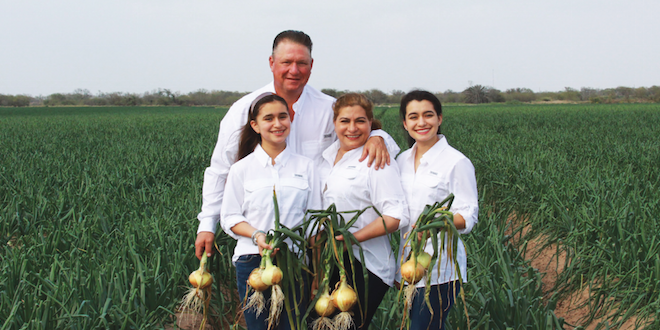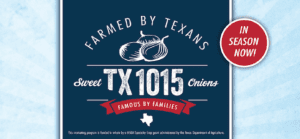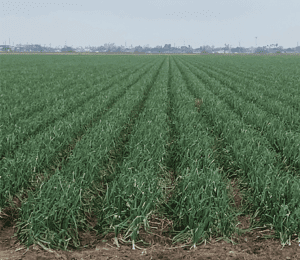

Sep 2, 2021Onion growers overcome weather, navigate marketing
The Mike Davis family and dozens of other South Texas families who grow sweet onions recently finished a dynamic season of farm operations and marketing.
Despite a baffling freeze, and complications brought on by COVID-19, they continued to get a product to market. And a new marketing campaign aimed at consumers brought new awareness to the group’s crops. It’s a timely effort for a group that’s facing some possible changes as its Federal Marketing Order is being reviewed by the USDA.
It’s been a good season’s work.
“I enjoy it. I don’t know anything else – I’ve been doing this my whole life,” said Davis, whose Tex Mex Sales LLC farms 350-400 acres near Weslaco, Texas, in addition to selling onions from New Mexico and Mexico. “But I enjoy producing onions, selling it and packing it and getting it to the consumer for them to enjoy. It’s a great feeling to be able to do all that and employ people in the meantime because most of my employees in Texas are the same people every year – they’re families that work for me during our season at the (packing shed) and now at the farm, and they’re part of the family.”
Valentine’s Day massacre
Texas, which has about 12,000 acres of bulb onions, according to the USDA Economic Research Service, experienced a nine-day cold spell Feb. 11-20 that formed ice on the plant leaves. With a few days’ warning, Davis resorted to soaking the fields to lessen the effects on the plant roots.
“It’s always better to have it watered heading into a weather event,” Davis said. “When your beds are wet, even if it’s cold, your ground temps are obviously warmer than the air outside.”
Even so, the weather took a toll. Davis said he hadn’t seen such conditions in 30 years.
“I would say we were down a couple of hundred bags an acre, plus we were two weeks late,” he said. “But you know, if I were to talk to you on the 15th of February, I might not admit it, but then I might have thought that crop would have been lost because these onions completely froze.”
As it happened, though, the slow warm-up that followed the cold was easy on the plants.
“Within a week, you could see they were starting to come back,” Davis said.
Telling their story
In a year when Texans had to grow with historic low temperatures, they also were innovating with a new Texas 1015 Sweet Onion (TX1015) marketing campaign that ran during the 2020-2021 season. The effort was funded by a USDA Specialty Crop Grant administered by the Texas Department of Agriculture and focused efforts directly on American consumers through a variety of platforms, engagements and awareness campaigns.
The new marketing program, with the main tagline of “Farmed by Texans, Famous by Families,” for the first time focused on reaching out directly to consumers. A previous marketing effort had been focused on a business-to-business marketing strategy, said Dante Galeazzi, manager of the South Texas Onion Committee and CEO and president of the Texas International Produce Association (TIPA).
“What we were looking to do is rebuild the brand awareness,” he said. The Texas 1015 onion or TX1015, is a sweet onion with higher water content and lower pyruvic acid than storage onions. As a fresh onion, TX1015 is available from March through June in the deep south of Texas (Rio Grande Valley) and from May through July in south central Texas (Uvalde/Winter Garden), according to the campaign website.
However, to too many consumers, “an onion is an onion is an onion,” Galeazzi said. Included in the marketing campaign led by Full Tilt Marketing was a series of 14 recipes for consumers to try that brought out the best in the onion.


Both traditional and digital marketing methods helped engage consumers. The first year of the campaign resulted in more than 18,000 direct social engagements. A branded, traditional media publicity effort, called a MAT release, cataloged over 1.4 million impressions. Additional storytelling highlighted the TX1015 growers, packers and shippers in two series of videos titled “How do you eat a Texas Sweet Onion” and “South Texas Farming – Building a Family Legacy.”
“I did like it,” Davis said of the marketing campaign. “I think it’s a lot better than what we had in the past.” His daughter, Kristen Davis, who’s the farm’s sales coordinator and food safety coordinator, has been able to use the content on the farm’s social media accounts. With greater brand recognition and customer loyalty, “we can raise awareness so our retailers use more Texas 1015s,” he said.
Galeazzi said the campaign was a way for consumers to get to know the multi-generational farming families like the Davises who make up the tight-knit group. Three generations of the Davis family have been involved in Tex Mex Sales. Grandfather Marvin Davis started the company in 1968. Mike worked his way up becoming a full partner in 1994. In addition to Kristen, he has two other children: Michael Jr., who plans on returning to the farm after college, and his younger daughter Kimberly.
While the Davises are a good example of the farming families who are the area’s backbone, “we aren’t promoting just one of the growers,” Galeazzi said.
Other growers featured in the videos included Frank Schuster of Val Verde Vegetable Co. Inc. in McAllen, Courtney Schuster at Rio Fresh Inc. in San Juan, Michael Helle with Green Gold Farms in Edinburg, Bret Erickson at Little Bear Produce in Edinburg and Wayne Reavis of Rio Grande City. There are 23 USDA-approved shippers of the onions in South Texas, Galeazzi said.
“It’s a small community, truly,” Mike Davis said. “Everybody reaches out to each other if need be.”
Planning ahead
Galeazzi said the marketing campaign will continue. The planning phase for the 2021-2022 effort will begin in September and planting of the TX1015 crop will begin October.


The federal marketing order for onions coming out of South Texas creates a higher level of minimum standard than a U.S. Grade 1 onion. South Texas’ order, which applies to onions coming out of 35 southern Texas counties, is one of only three onion-producing regions that have a federal marketing order. The others are Walla Walla (Washington state) and Vidalia (Georgia). The Idaho-Eastern Oregon area also has a federal marketing order for its storage onions.
The South Texas order has existed since 1961, and a super-majority vote is required every six years to continue the effort. However, the last referendum, held Sept. 21 through Oct. 13, 2020, fell just short of the required percentage: 57% of South Texas onion producers, representing 53% of the volume produced by those voting, favored continuing the marketing order. For the marketing order to continue, two-thirds or more of producers voting, or producers representing the production of two-thirds or more of the volume produced, would be needed to vote in favor of continuance. Galeazzi said he’s working with the USDA to sort out the next steps.
It’s not over, yet. The USDA Agricultural Marketing Services (AMS) Specialty Crops Program Deputy Administrator Sonia N. Jimenez wrote in a March 9 clarification after the vote that “AMS is initiating a rulemaking process to provide the public with an opportunity to comment on a proposed rule to terminate the marketing order.”
Grading processes continued through the onion season, while “enforcement of the obligation on the part of regulated handlers to pay assessments to the South Texas Onion Committee” was suspended.
If the federal marketing order were to go away, so would the South Texas Onion Committee, Galeazzi said. But the consumer-faced marketing campaign is paid for with the Specialty Crop Block Grant, and “we have every intention of continuing this campaign.”
TIPA would also continue, and “our intentions would be no different,” he said.
— Stephen Kloosterman, associate editor; Photo at top: The Davis family grows sweet onions in South Texas, while also selling onions grown in Mexico and New Mexico. Michael Davis is pictured in this photo with his wife Claudia and daughters Kimberly, left, and Kristen. Son Michael Davis Jr. is not pictured but plans to return to the family business after college. Photo courtesy of Tex-Mex Sales.














